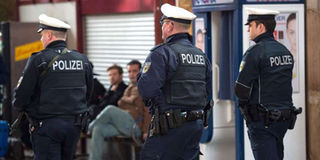Lessons Kenyans can draw from the twin attacks on Brussels

Police officers patrol a Brussels street on Friday. Kenyans should worry about the emerging tactics used by terrorists. PHOTO | AFP
What you need to know:
Judging by last Tuesday’s attack, it is clear that aviation security must be upgraded in terms of human and technical capacity.
An effective system must have multiple layers that are professionally designed and implemented according to the security risk assessment.
The biggest mistake we make is that many security set-ups in Kenya and elsewhere are based on rituals.
The attack on Europe’s capital, Brussels, came as a shock and has raised questions on aviation security.
This was no ordinary attack. It was well planned and took place when Belgium’s level of security was high.
How secure is the aviation industry? Aviation security covers the physical security of airports, travellers, staff, planes and passengers on board and at waiting terminals and those arriving and leaving.
This means a lot needs to be done to radically make the aviation industry secure.
Judging by last Tuesday’s attack, it is clear that aviation security must be upgraded in terms of human and technical capacity.
Many organisations have added security equipment to guard against infiltration by terrorists.
It is now common to see guards with metal detectors and sniffer dogs and X-ray gadgets at embassy and hotel gates.
A properly secured place means a combination of technical and human capacity.
RITUALS
However, many screening kits do not provide watertight security solutions. They only provide a first layer of security.
An effective system must have multiple layers that are professionally designed and implemented according to the security risk assessment.
The biggest mistake we make is that many security set-ups in Kenya and elsewhere are based on rituals.
It is common to see people walking through metal detectors which trigger alarms but the guards don’t bother to respond.
Unlike other criminals, terrorists take time to plan their missions. It may take years to identify, analyse and select a potential target. A good example is the 9/11 attacks.
Security at US airports is first class but the terrorists compromised the system. The best way to reduce a threat is to have highly trained people accompanied by appropriate equipment. Human intelligence is critical in countering terrorism.
In Brussels, the bombers walked confidently with their arsenal. They had studied the routine inspection at the airport. Many airports will now change their screening priorities.
MOGADISHU MISHAP
Two months ago, a plane that had just left Mogadishu on its way to Djibouti was ruptured by a bomb while airborne.
Miraculously, the pilot flew back and landed safely. Unfortunately, the incident was not given global prominence; after all, it took place in a failed state.
We must be worried about the evolving tactics used by terrorists. With well articulated awareness programmes, airport workers can complement the efforts of security officers.
Many airports are moving away from deploying uniformed armed police officers.
They instead go for undercover operatives; some working as cleaners, bank front desk officers or even taxi drivers. Deploying uniformed officers in such areas is risky.
Travellers must be ready to put up with inconveniences of heightened security and overhead costs that come with this.
With security measures of this nature, travel costs may go up and this may affect the entire aviation industry and other sectors in the periphery, particularly tourism.
The private citizen’s role is equally important. Terrorists live with us and so information-sharing between citizens and law enforcement agencies is vital.
The other important lesson for Kenyans after the Brussels attack is that we must rally behind the government when faced with threats. It is no time for blame games.
Twalib Mbarak is a retired military officer and certified security management consultant. [email protected]





